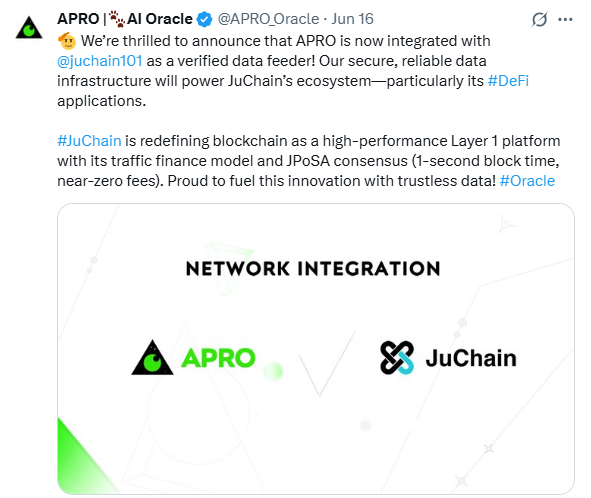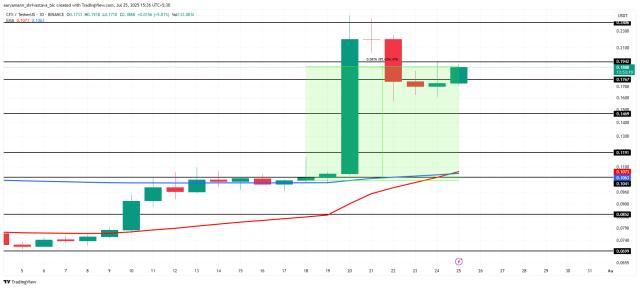Published by JuCoin Labs Research Institute
On June 18, the U.S. Senate officially passed the GENIUS Act, marking a substantial step forward in stablecoin regulatory legislation and a major milestone for the crypto industry entering a formal regulatory framework. Stablecoins, Bitcoin, and other mainstream crypto assets have also become part of corporate asset allocations. According to Arkham Intelligence, as of now, 131 publicly listed U.S. companies hold over 420,000 BTC in total.
Meanwhile, the U.S. SEC is gradually signaling a more favorable stance toward the DeFi market. On June 9, the new SEC Chair publicly announced a new policy stating that “DeFi should not be limited by form and deserves recognition for its compliance potential,” sparking widespread discussion on DeFi and regulatory integration. Against this backdrop, RWA, DeFi, and stablecoins have become key focus areas for capital, developers, and regulators.
As an emerging on-chain ecosystem, JuChain is keeping pace with these trends—promoting native DeFi protocols while also exploring on-chain credit and RWA infrastructure. This report analyzes three of its key ecosystem projects: APRO Oracle, JuFinance, and Labubu Fans, uncovering investment opportunities under the new regulatory framework.
1. APRO Oracle
Project Overview:
APRO Oracle is a next-generation oracle network built for large language models (LLMs) and AI Agents, aiming to solve three core issues in blockchain-based AI applications: data latency, hallucination, and unverifiable content. As models like GPT become widespread, AI systems increasingly rely on real-time data in high-risk scenarios like finance, governance, and gaming. However, most models are only trained up to 2024 and lack on-chain validation mechanisms, leading to potential misjudgments in DeFi APY or market events.
APRO introduces the “Oracle 3.0” concept to bridge the data gap between AI and Web3 and become the trusted data foundation for AI.
In 2024, APRO Oracle raised $3 million in a seed round, backed by top-tier investors like Polychain Capital and Franklin Templeton. Initially focused on the Bitcoin ecosystem, it has since expanded to multiple chains, including BNB Chain and JuChain. The project has even caught the attention of CZ. APRO’s native token has not yet launched.

Key Highlights:
- Oracle 3.0 Architecture: Tailored for AI multi-agent systems, with features like AI Scheduler, financial model validation, and BTC Layer2 data sync—designed specifically for data-driven AI and financial applications.
- Multi-chain Support: APRO is compatible with Bitcoin (BitVM, Bitlayer), Solana VM (SVM), EVM chains (JuChain, Polygon), and zkLink, becoming key infrastructure connecting AI and DeFi.
- Strong Backing: Early investment from Polychain Capital and FTDA US, with Franklin Templeton as strategic advisor—enabling deep collaboration with financial institutions and infrastructure providers.
Operational Data:
- Chains Deployed: 26 mainnets including BNB Chain, JuChain, Bitlayer, Polygon, zkLink.
- Total Calls: Over 400,000 oracle calls, with daily average of 216, covering real estate valuation, credit scoring, BTC pricing, etc.
- Integrated Projects: Over 196 ecosystem partners, including Lorenzo, zkLink Aggregated Rollup, Bitlayer Labs.
Investment Thesis:
APRO sits at the intersection of two mega trends—AI Agents and on-chain verifiable data. The AI Agent market is projected to exceed $100 billion by 2035, and on-chain verifiable data will be essential in mitigating hallucinations in large models. APRO uniquely combines Oracle, AI Agents, and blockchain validation into a commercial-ready service layer.
With strong institutional backing and ecosystem integration (BNB Chain, JuChain, etc.), APRO is positioned to become the standard data layer in a multi-chain AI-driven future.
2. JuFinance
Project Overview:
JuFinance is a Web3-native credit finance protocol incubated by the JuCoin team, aiming to build an on-chain credit scoring system using behavioral data. Core components include:
- JuScroll credit scoring
- DeFi products based on credit (lending, payments, staking)
- Decentralized identity (DID) system
JuFinance focuses on contribution-based value creation, integrating AI and DeFi to drive the Web2-to-Web3 financial transition. It introduces a contribution-driven token minting mechanism, allowing user behavior to directly convert into financial assets.
In partnership with JUF Pay, it offers a 100% cashback on-chain payment solution, where every transaction also boosts credit and asset value.

Key Highlights:
- $JU Token Mining: Users earn $JU based on their contribution to the ecosystem.
- AI × DeFi Integration: AI helps assess credit and distribute personalized rewards.
- Behavior-based Minting: Token supply is limited and withdrawals are locked to ensure value stability.
- JUF Pay Cashback: 100% cashback to users, instant fiat to merchants, immune to market volatility.
Progress:
JuFinance has transitioned from concept to initial product rollout, with a complete financial primitive suite including scoring, DID, and credit-based rewards. It has launched staking, airdrops, and loyalty programs to attract ecosystem users.
Currently in closed beta with an invite-only system, early users receive airdrops, ranking, and bonus rewards.
Investment Thesis:
JuFinance builds a sticky, high-activity financial ecosystem through contribution-based minting and innovative cashback payments. This reduces speculative risks and enhances $JU’s long-term value.
Its AI-powered credit scoring and asset management improve risk control and personalization, positioning JuFinance as a leader in the transition from speculation to value-creation in on-chain finance.
3. Labubu Fans
Project Overview:
Labubu Fans is a high-profile Meme project on Solana, inspired by the top Asian collectible IP Labubu. While not officially affiliated with Pop Mart, Labubu’s cultural popularity across China, Japan, and Southeast Asia has driven strong attention since its October 2024 launch.
Positioned as a fan-driven meme token, $LABUBU leverages IP-themed merch, collaborative art, and NFT-based character licensing to build a creative and culturally rich ecosystem.
It has launched on major Solana DEXs and CEXs including JuCoin, and is expanding into NFTs, gaming, and user-generated content incentives.

Key Highlights:
- IP-driven Community: Labubu has a massive fanbase, and $LABUBU taps into this organically through unofficial fan positioning—encouraging viral content creation and merch.
- Meme + NFT + GameFi: Developing NFTs, AR collectibles, and casual meme games to drive user engagement and convert traffic into assets.
- Strong Community Engagement: Backed by major exchanges and active community campaigns, it’s one of the most vibrant meme communities on Solana.
On-chain Data:
- Addresses: ~17,694 holders, ~4,100 daily active addresses (7D average)
- Transactions: 148,000+ total, ~$3.6M 7D DEX volume
- Market Cap: ~$21.76M, 24h volume over $13M
- Token Distribution: 997.74M total supply, top 50 holders hold ~18%, showing strong decentralization
Investment Thesis:
$LABUBU is a high-beta meme token with strong short-term community-driven upside. However, recent price drops in physical Labubu collectibles (some down over 40%) show risks tied to the underlying IP’s real-world popularity.
While short-term catalysts (NFTs, exchange listings, community events) may drive rebounds, long-term success depends on building genuine IP licensing, a robust NFT ecosystem, and meaningful on-chain engagement. Without this, the project may struggle as both digital and physical interest fade.
Summary
The crypto industry is moving toward regulatory clarity and multi-chain collaboration. JuChain aligns with this by creating an open ecosystem around on-chain credit and RWA assets. Its modular, multi-chain architecture enables rich and flexible applications, empowering developers and users alike.
JuChain’s ecosystem strategy emphasizes compliance, native innovation, and integration. With strong cross-chain and Web2 interoperability, it stands out as more than just a single-track project—it’s a next-gen platform for compliant Web3 development, offering clear paths for collaboration among developers, users, and institutions.
At the intersection of policy reform and tech evolution, JuChain is poised to become a foundational platform for the next stage of compliant Web3 infrastructure.





